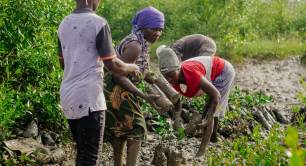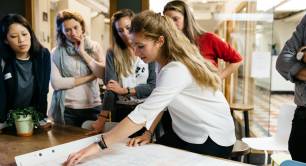Trading for Good: Step forward the new wave of community entrepreneurs to take social change into their own hands
Through its last national programme The School for Social Entrepreneurs supported 2,400 social enterprise and community business leaders who in turn touched the lives of 2.1m people. Now, with the launch of their newest programme Trading for Good, there’s an opportunity for hundreds more to get the skills and support they need to tackle the social and environmental issues on their doorstep.
In a vibrant redbrick building in north Liverpool, clothes are not the only things getting a freshen up.
Kitty’s Launderette is an ecological laundry and dry-cleaning service that has been offering a new approach to what it means to be a good business since 2019. They’re a worker-community cooperative, a thriving commercial operation and a resoundingly social enterprise.
At Kitty’s, Real Living Wage jobs go hand-in-hand with free community activities from film nights and writers’ groups to children’s events and knitting clubs. At Kitty’s, all workers are paid the same wage and share their time between laundry piles and strategy tasks. At Kitty’s, a Community Board, made up of customers and local organisations, is helping to guide success, from winning the Community Based Social Enterprise award at the UK Social Enterprise Awards in 2023 to attracting the custom of two local Premier League football clubs.
“It's knowing what we're doing is bigger than any of us could do on our own,” says Grace Harrison, Kitty’s Launderette’s Organisational Development Lead, and it’s a prime example of how impact grows when partnerships are values-led.
These partnerships run all the way through the organisation, from accountants specialising in social enterprises to HR services coming from a fellow cooperative. The result is a business forecasting not only £185,000 in annual turnover but £28 worth of social returns for every £1 local people spend.
It's knowing what we're doing is bigger than any of us could do on our own – Grace Harrison, Kitty's Launderette
“There are some companies that say: ‘We invest 1% of our profits into this and that’. But for us, every pound we have has power,” Grace shares. “We’re still running a business like anyone else with pressure to pay the bills, wages, and to keep the customers happy, but there are extra layers – our responsibility to the environment and the local community,” and it’s clear at Kitty’s, compassion wins out.
Compassion, however, can seem a luxury good at times when the cost-of-living-crisis, lack of community resources and environmental decline present daunting barriers to growth. On the dawn of political change, however, fresh shoots perhaps bring new hope. At the School for Social Entrepreneurs (SSE), these shoots take the form of a new community business programme.
Trading for Good is a practical learning programme for community business leaders and socially-minded business hopefuls looking to lay roots in an often intimidating commercial landscape. The scheme offers participants access to expert guidance and peer-to-peer learning from a willing cohort of over 3,000 SSE fellows, while Match Trading™ Grants of up to £4,000 acknowledge the importance of affirmative backing amidst a volatile fiscal backdrop.
We know these programmes work. We also know that there are lots of people out there who want to make an impact – Alastair Wilson, SSE
For Alastair Wilson, CEO of SSE, it’s a common sense approach. “We know these programmes work. We also know that there are lots of people out there who want to make an impact and social enterprises and community businesses are efficient vehicles for doing that.” The evidence speaks for itself in the 2,400 participants that have gone on to benefit 2.1m people from one of the school’s previous programmes.
Kitty’s Launderette represent just one of these participants, having taken part in two previous schemes; the Start Up and Trade Up programmes. For Kitty’s, the development opportunity provided the skills, stimulus and confidence to turn a local community project into a flourishing - and profitable - socio-environmental collective.
“[The SSE] kind of covered everything,” Grace explains, as she describes a whole host of course sessions from the nitty gritty of finance to how to embed values, culture and social impact. “You also have a lot of peer-to-peer support because everyone else on the programme is trying to run or set up something. So you have these shared experiences and can sit down with each other saying ‘this is really hard’ or ‘we had that issue last year and this is how we navigated it’.”
|
What is Trading for Good? Trading For Good is a five-year project, delivered by School for Social Entrepreneurs with support from Power to Change and The Dulverton Trust, in partnership with The National Lottery Community Fund – the largest community funder in the UK. Thanks to National Lottery players, almost £5m has been awarded to provide funding, education and support to more than 650 social entrepreneurs and community businesses across England. The programme will equip participants with the knowledge, skills, and confidence to develop and grow projects that tackle social and environmental challenges. |
Today, Kitty’s Launderette is thriving, and has honed a sustainable business model (splitting their revenue 70% laundry service, 30% grants and funds), able to deliver a much needed local service alongside free community resources. It’s a narrative that stands testament to a larger story where SSE’s research shows how combining action-led, collaborative cohorts with pound-for-pound grant funding, yields an average organisational income uplift of 29% compared to a 12% increase from traditional grant structures.
The challenges of impact-led business are, however, not lost on the SSE or its partners. “We know community businesses work to build stronger communities and prosperous local economies,” says Tim Davies-Pugh, CEO of one of Trading for Good’s partners, Power to Change, “but like any business, they need affordable, flexible, and accessible funding to be sustainable.” These realities explain why, even in Kitty’s case, it took three years of planning, community engagement, business development and fundraising to get the launderette up and running.
We know community businesses work to build stronger communities... but like any business, they need affordable, flexible, and accessible funding to be sustainable – Tim Davies-Pugh, Power to Change
“We wanted to create a space with as few barriers to entry as possible,” Grace says. “Pubs and community centres are brilliant but if you’re in recovery as a newly arrived person to a community you might not see yourself welcome or ever cross the threshold. But everybody’s got to wash their clothes one way or another.
“There’s something really powerful in that, in a space that everybody uses. But when we started we were just a couple of local residents exploring an idea and none of us had run a business before.”
The scale of this learning curve, and the one so many budding social enterprises have to face, explains why networks like the SSE remain vital to distribute support. For Kitty’s though, the challenges have proved well worthwhile and their success at balancing profit and purpose counters a negative stereotype amongst those that see “business” as a dirty word.
At the SSE, however, the tremendous capacity of commerciality to serve and enhance communities through trading, supply chains, developmental opportunities and unrestricted revenues, illustrates the benefits of so called “enlightened self-interest”. It’s a philosophy which has guided the organisation since its own launch back in 1997 – and one which successive governments have also been exploring too with a raft of initiatives over the past 20 yaers. These range from the Social Investment Taskforce and Social Enterprise Unit in the early 2000s through to Better Society Capital, the world’s first social investment wholesale bank, which has been building the UK social investment market since 2012.
As Kitty’s celebrates its 5th birthday, Grace says their success comes down to “collectivism and solidarity”. Whatever the next five years may bring, this brand of locally-rooted business, driven by a social purpose and both accountable and attentive to community experiences, continues to offer a resilient tonic to our most challenging social and environmental issues.
In the first days of a new government, it’s a message that offers fresh, air-dried hope that – even in the face of tight budgets and pressure to stick to fiscal rules – we can expand the rewards of social progress and find new solutions if the people at the heart of these issues are given the tools they need to take social change and community wellbeing into their own hands.
This feature is produced in partnership with The School for Social Entrepreneurs. To find out about taking part in the School for Social Entrepreneurs’ Trading for Good programme, or for details about applications and eligibility, please see here.
Photos: Courtesy of Kitty's Launderette.
Thanks for reading Pioneers Post. As an entrepreneur or investor yourself, you'll know that producing quality work doesn't come free. We rely on our subscribers to sustain our journalism – so if you think it's worth having an independent, specialist media platform that covers social enterprise stories, please consider subscribing. You'll also be buying social: Pioneers Post is a social enterprise itself, reinvesting all our profits into helping you do good business, better.




